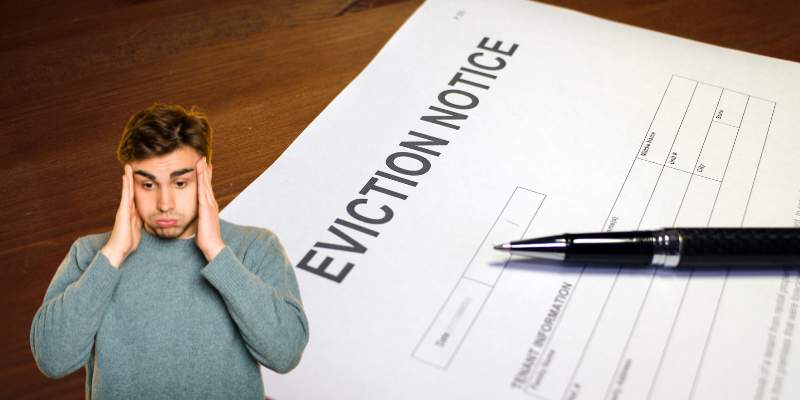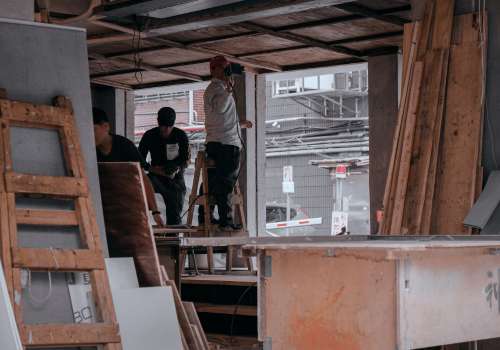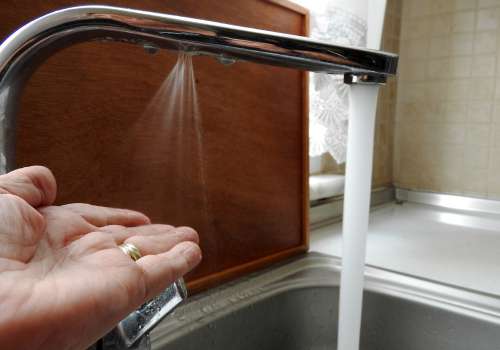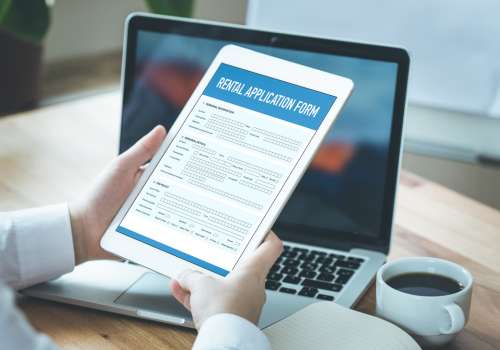19 Stupid Mistakes Guaranteed to Get You Evicted
You’ve probably heard that being a good tenant is simply about paying your rent on time, but there’s more to the story than meets the eye.
While timely payments are essential, countless renters find themselves facing eviction for seemingly minor infractions they didn’t even know they were committing.
From sneaking in an unauthorized pet to running a side hustle from your apartment, these innocent-seeming decisions can quickly spiral into lease violations that put your housing at risk.
Let’s explore the most common blunders that could have you packing your bags, and more importantly, how to avoid them.

Unauthorized Pets
One of the fastest ways to jeopardize your rental agreement is keeping unauthorized pets in your apartment or house.
Even if you’ve successfully hidden your furry friend for months, you’re taking an unnecessary risk that could lead to immediate eviction proceedings and the loss of your security deposit.
Most landlords have specific pet policies for good reasons: property damage, noise complaints, liability issues, and insurance requirements.
If you’re caught with an unauthorized pet, you’ll likely face a series of escalating consequences.
First, you’ll receive a lease violation notice demanding the removal of the pet.
If you don’t comply, you could face eviction within days, depending on your local tenancy laws.
Don’t assume you can outsmart your landlord.
Maintenance workers, neighbors, or routine inspections will eventually reveal your secret pet.
Instead, either negotiate with your landlord for pet approval or find pet-friendly housing.
Many landlords will consider allowing pets with additional deposits or monthly pet rent.
If you absolutely must have a pet, do it legally – the stress of hiding an animal and risking eviction isn’t worth the temporary satisfaction of breaking the rules.
Late Rent Payments

Falling behind on rent payments serves as the most common trigger for eviction proceedings across the U.S.
If you’re struggling to pay rent on time, you’re putting your housing stability at serious risk.
Most landlords begin eviction procedures after just one missed payment, and multiple late payments create a documented pattern that can damage your rental history for years.
Don’t assume your landlord’s flexibility or verbal agreements will protect you.
Your lease specifies the exact date rent is due and any grace period you’re allowed.
Even if you’re just a few days late, you could face late fees, negative credit reporting, and eventual eviction notices.
Many jurisdictions allow landlords to start eviction proceedings immediately after rent becomes overdue.
If you anticipate payment problems, communicate with your landlord before the due date.
You might negotiate a payment plan or temporary arrangement, but get everything in writing.
Consider setting up automatic payments or calendar reminders to avoid missing due dates.
When money’s tight, prioritize rent above other expenses – you can recover from a late credit card payment, but an eviction on your record will severely limit your future housing options.
Illegal Subletting
A tenant’s unauthorized subletting arrangement represents a serious lease violation that often leads straight to eviction.
When you sublet without your landlord’s permission, you’re fundamentally bringing in an unauthorized occupant who hasn’t been screened or approved.
This breaks the trust between you and your landlord while potentially violating local housing laws.
Don’t think you can secretly rent out your spare room or entire unit through platforms like Airbnb or Craigslist.
Modern landlords actively monitor these sites, and neighbors often report suspicious rental activity.
Even if your subletter pays on time and behaves perfectly, you’re still breaching your lease agreement.
The consequences go beyond eviction.
You’ll remain legally responsible for any damages, unpaid rent, or legal issues caused by your unauthorized subletter.
Plus, an eviction on your record will make it extremely difficult to rent another property in the future.
If you need to sublet, always approach your landlord first and get written permission.
Many landlords will work with you if you’re transparent about your situation.
They might even help you establish a legal subletting arrangement that protects everyone’s interests.
Unregistered Roommates

Similar to unauthorized subletting, bringing in unregistered roommates can quickly lead to eviction proceedings.
Most lease agreements explicitly state that all adult occupants must be screened, approved, and added to the lease by the landlord.
When you secretly move someone in, you’re breaching your contract and risking immediate lease termination.
You’re probably thinking you can easily hide an extra roommate, but landlords have multiple ways to discover unauthorized occupants.
They’ll notice extra cars in the parking lot, increased utility usage, neighbor complaints, or suspicious activity during property inspections.
Security cameras and maintenance visits can also expose your secret arrangement.
The consequences extend beyond eviction. You’re legally responsible for any damages or lease violations caused by your unauthorized roommate.
If they commit crimes, disturb neighbors, or skip out on rent, you’ll face the fallout alone.
Additionally, your landlord can sue you for breach of contract, potentially affecting your rental history and credit score.
Don’t jeopardize your housing stability for short-term convenience.
If you need to add a roommate, follow the proper channels – submit an application, allow for background checks, and get written approval from your landlord.
Property Damage
The three most common ways tenants damage rental properties are through negligence, unauthorized modifications, and reckless behavior.
When you ignore maintenance issues like leaky faucets or clogged drains, you’re creating expensive problems that’ll come back to haunt you.
Water damage from unreported leaks can destroy floors, walls, and ceilings, leaving you legally responsible for thousands in repairs.
Unauthorized modifications are another fast track to eviction.
Don’t drill holes for mounted TVs, paint walls without permission, or install new fixtures without your landlord’s written approval.
These changes, even if you think they’re improvements, violate most lease agreements and can result in immediate termination of your tenancy.
Reckless behavior isn’t just about wild parties – it includes overloading electrical outlets, flushing inappropriate items, or allowing pets to destroy carpets and woodwork.
You’ll also face eviction if you or your guests punch holes in walls, break windows, or damage appliances.
Remember, your security deposit won’t cover significant damage, and your landlord can sue you for repair costs beyond that amount.
Property damage isn’t just about losing your deposit – it’s about losing your home.
Noise Violations

Physical damage isn’t the only way to get kicked out – disruptive noise ranks among top reasons for eviction notices.
Your right to enjoy your space doesn’t override your neighbors’ right to peace and quiet.
Most lease agreements include specific “quiet hours” and noise restrictions that you’ll need to follow religiously to avoid complaints.
You’re walking on thin ice if you’re hosting frequent parties, playing loud music, or allowing your dog to bark continuously.
Many cities have noise ordinances that kick in between 10 PM and 7 AM, but your lease might set stricter limits.
Three noise complaints often trigger automatic eviction proceedings, and some landlords won’t even give you that many chances.
Don’t assume your walls are soundproof – they rarely are. Bass from speakers, loud TV volumes, and stomping around can travel through floors and walls more than you’d expect.
If you’re planning activities that might get noisy, communicate with your neighbors beforehand. Better yet, consider taking loud activities elsewhere.
Running a Business
Operating a business from your rental unit frequently violates standard lease agreements and local zoning laws, putting you at immediate risk for eviction.
Whether you’re running an online shop, teaching music lessons, or offering massage therapy, your entrepreneurial endeavors could land you in serious trouble with your landlord and local authorities.
Most residential leases explicitly prohibit using the property for commercial purposes.
Even if your business seems harmless, increased foot traffic from customers, delivery services, or employees can damage common areas and disturb other tenants.
Your activities might also violate zoning regulations that separate residential and commercial spaces.
The consequences extend beyond eviction.
Your business operations could invalidate your renter’s insurance, leaving you liable for accidents or injuries.
Additionally, running certain businesses, like food preparation or childcare services, requires specific permits and health inspections that residential properties can’t obtain.
If you’re determined to run a home-based business, consider these alternatives: negotiate with your landlord for written permission, rent a commercial space, or find a landlord who specifically allows home businesses.
Don’t risk losing your home over an unauthorized venture.
Unauthorized Home Modifications

Making unauthorized home improvements or structural changes to your rental property ranks among the fastest ways to trigger an eviction notice.
Even if you believe you’re enhancing the property’s value, any modifications without your landlord’s written consent can violate your lease agreement and local building codes.
Don’t assume you can knock down walls, install new fixtures, or make major alterations just because you’re paying rent.
Common violations include removing built-in appliances, painting walls without permission, installing satellite dishes, changing locks, or modifying electrical systems.
Even seemingly minor changes like drilling multiple holes for mounting TVs or shelves can cross the line.
If you’re considering any modifications, submit a formal written request to your landlord first.
Document everything with photos and keep copies of all correspondence.
When your landlord approves changes, get it in writing and specify whether you’ll need to restore the property to its original condition when moving out.
Remember that unauthorized modifications can cost you your security deposit and lead to additional charges for property restoration.
Some changes might even require permits from local authorities – another reason to always get landlord approval before picking up any tools.
Hoarding
While unauthorized modifications can damage property, hoarding behavior poses an even more serious threat to both living conditions and tenant rights.
You’re at serious risk of eviction if you’ve accumulated excessive belongings that block exits, create fire hazards, or attract pests.
Landlords won’t tolerate conditions that violate health codes or endanger other tenants.
You’ll likely face immediate lease termination if your hoarding has resulted in structural damage from excess weight, blocked ventilation systems, or created unsanitary conditions.
Most leases explicitly prohibit storing items that impede maintenance access or emergency responders.
If you’ve filled your space with stacks of newspapers, collections of items, or mountains of clothing that prevent normal use of rooms, you’re violating standard lease terms.
Don’t expect sympathy from property managers – they’re legally obligated to maintain safe living conditions for all tenants.
Even if you consider your items valuable, you can’t compromise building safety or sanitation.
If you’re struggling with hoarding tendencies, seek professional help before your landlord discovers the issue.
Many communities offer hoarding intervention services that can help you declutter and maintain your housing stability.
Ignoring Maintenance Requests

Small maintenance issues can quickly escalate into major problems that justify eviction if you repeatedly ignore them.
When you notice a leaky faucet, malfunctioning smoke detector, or minor pest problem, it’s your responsibility to report it promptly.
Failing to do so can result in extensive property damage that violates your lease agreement.
Your landlord isn’t psychic – they rely on you to alert them about problems in your unit.
If you don’t report issues, they can argue that your negligence caused preventable damage.
For example, an unreported water leak might lead to toxic mold growth or structural damage, while ignored pest problems can spread to neighboring units.
These situations often result in costly repairs that your landlord can legally hold you accountable for.
Many states require tenants to report maintenance issues within a reasonable timeframe.
If you don’t, you’re not only risking your security deposit but also giving your landlord grounds for eviction.
Keep detailed records of all maintenance requests, including dates and follow-up communications.
This documentation protects you if your landlord claims you failed to report problems and helps establish that you’ve fulfilled your responsibilities as a tenant.
Drug-Related Activities
Drug-related offenses are among the fastest paths to eviction, with most leases containing zero-tolerance policies for illegal substances.
You’ll face immediate lease termination if you’re caught manufacturing, selling, or distributing drugs from your rental property.
Even if you’re not directly involved, allowing others to conduct drug activities in your unit makes you legally liable.
Don’t assume your landlord won’t find out.
Modern security systems, neighbor complaints, and routine inspections make it increasingly difficult to hide illegal activities.
Law enforcement involvement automatically triggers lease violations, and you’ll likely face both eviction and criminal charges.
Even in states with legalized marijuana, your lease terms typically supersede state laws, meaning your landlord can still evict you for legal cannabis use if it’s prohibited in your rental agreement.
The consequences extend beyond eviction – you’ll struggle to rent future properties due to the drug-related eviction on your record.
Many landlords perform extensive background checks and automatically reject applicants with drug-related housing incidents.
Additionally, you could face civil asset forfeiture, where authorities seize your personal property connected to illegal drug activities.
It’s not worth risking your housing stability and future rental opportunities.
Violating Occupancy Limits

Although occupancy limits might seem like arbitrary rules, exceeding them is a serious lease violation that can trigger immediate eviction proceedings.
These restrictions exist due to safety regulations, building codes, and insurance requirements that your landlord must follow.
When you ignore occupancy limits, you’re not just breaking your lease – you’re potentially violating local housing laws.
You’ll face eviction if you let unauthorized people live in your unit, even temporarily.
This includes letting your significant other move in without approval, taking in roommates who aren’t on the lease, or allowing friends to crash on your couch for extended periods.
Many tenants try to fly under the radar by sneaking in extra occupants, but landlords usually discover the truth through neighbor complaints, increased utility usage, or routine inspections.
Don’t assume you can talk your way out of it once caught.
Having too many people living in your unit strains building resources, increases wear and tear, and may invalidate your landlord’s insurance coverage.
The smartest approach is to formally request permission for additional occupants and get it in writing before anyone moves in.
Utility Payment Defaults
Failing to pay utility bills ranks among the fastest ways to trigger an eviction notice, even if you’re current on rent.
Most lease agreements explicitly state that maintaining active utilities is your responsibility as a tenant.
When you default on these payments, you’re technically breaching your lease terms, giving your landlord grounds for eviction.
You’ll face particular risk if your utilities are included in your rent payment or if the accounts remain in your landlord’s name.
In these cases, your landlord receives the shutoff notices directly and won’t appreciate being stuck with your unpaid bills.
Even with utilities in your name, service disconnections can violate local housing codes, making your unit legally uninhabitable.
Don’t assume you can fly under the radar by letting just one utility lapse. Many municipalities require functioning electricity, water, and gas for a dwelling to be considered habitable.
If you’re struggling with utility payments, contact your providers immediately to discuss payment plans or assistance programs.
Some utility companies offer budget billing or income-based programs that can help you avoid defaulting.
Falsifying Rental Application Information

Dishonesty on your rental application can haunt you long after you’ve moved in.
When landlords discover you’ve provided false information, they’ll likely initiate immediate eviction proceedings, regardless of how well you’ve maintained the property or paid rent on time.
They’re legally entitled to terminate your lease based on fraudulent applications.
Common falsifications that trigger evictions include lying about your income, employment history, or rental references.
Don’t think you can fudge your salary or create fake pay stubs – landlords routinely verify employment and income details.
Similarly, they’ll contact your previous landlords to confirm your rental history, so fabricating references won’t work.
Criminal history is another area where lies catch up quickly.
Many landlords conduct ongoing background checks, and discovering undisclosed convictions gives them grounds for eviction.
The same applies to unreported pets, unauthorized roommates, or false claims about your credit history.
To protect your housing stability, provide accurate information from the start.
If you’re concerned about certain aspects of your history, it’s better to be upfront and explain your situation than risk eviction later.
Remember, lease termination due to application fraud can severely impact your ability to rent in the future.
Smoking in Non-Smoking Units

The seemingly harmless act of smoking in a non-smoking unit can quickly escalate into eviction proceedings.
Your lease agreement explicitly prohibits smoking for valid reasons: fire hazards, property damage, and neighboring tenants’ health concerns.
When you ignore these restrictions, you’re breaching your contractual obligations and putting yourself at risk of immediate lease termination.
Don’t assume you can hide the evidence.
Cigarette smoke permeates walls, carpets, and ventilation systems, leaving telltale signs that property managers can easily detect.
The lingering odors and yellow residue on walls and ceilings serve as permanent proof of your violation.
Even if you’re smoking near windows or using air purifiers, the damage remains measurable and costly to remedy.
Your landlord can legally charge you for deep cleaning, repainting, and replacing damaged materials – expenses that often exceed your security deposit.
Additionally, neighboring tenants affected by secondhand smoke may file complaints or legal actions against both you and the property owner.
If you’re a smoker, you’ll need to either find smoking-permitted housing or smoke off-premises.
The consequences of defying no-smoking policies aren’t worth risking your rental history and financial stability.
Airbnb Without Permission
Listing your rental unit on Airbnb without your landlord’s explicit permission creates serious grounds for eviction and legal consequences.
Most standard lease agreements explicitly prohibit subletting or short-term rentals, and your unauthorized Airbnb listing directly violates these terms.
You’re fundamentally running a commercial enterprise from a residential property without proper authorization.
Your landlord can immediately begin eviction proceedings upon discovering your unauthorized Airbnb activities.
Beyond eviction, you’ll likely face substantial fines, legal fees, and potential civil lawsuits if Airbnb guests cause property damage or disturb other tenants.
Many cities also impose strict regulations on short-term rentals, and you could face municipal fines for operating without proper permits.
Don’t assume you won’t get caught.
Property managers regularly monitor rental websites, and neighbors frequently report suspicious short-term rental activity.
If you’re interested in hosting on Airbnb, either negotiate this upfront with your landlord or wait until you own your property.
The quick cash from unauthorized Airbnb rentals isn’t worth losing your home and damaging your rental history, which could prevent you from securing future housing.
Parking Violations

Persistent parking violations might seem minor compared to unauthorized Airbnb listings, but they can quickly escalate into serious lease violations.
Your lease agreement specifies designated parking spots and rules for a reason – it’s not just arbitrary paperwork designed to restrict your freedom.
You’ll face problems if you repeatedly park in another tenant’s spot, leave vehicles in fire lanes, or store unregistered cars on the property.
Most landlords won’t immediately evict you for a single parking mishap, but they’ll document each violation.
Once you’ve accumulated multiple infractions, they’ve got solid grounds for termination.
Watch out for these common parking violations that trigger landlord action: blocking access to dumpsters or maintenance areas, parking oversized vehicles like RVs without permission, letting guests park in resident-only spaces, and abandoning broken-down vehicles.
Some properties even have strict rules about vehicle maintenance and repairs on-site.
Don’t risk your housing over something as avoidable as parking issues.
Read your lease’s parking policies carefully, get proper permits, and respect designated spaces.
If you need additional parking, negotiate with your landlord rather than breaking the rules repeatedly.
Threatening Neighbors
Making threats against your neighbors, whether verbal or implied, ranks among the fastest ways to get yourself evicted.
Most lease agreements contain specific clauses about maintaining a peaceful living environment, and threatening behavior directly violates these terms.
You’ll likely face immediate legal consequences, including potential criminal charges alongside eviction.
Don’t assume that subtle intimidation tactics will fly under the radar.
Security cameras, witnesses, and documented complaints can quickly build a case against you.
Even passive-aggressive notes or social media posts targeting your neighbors can be used as evidence of threatening behavior.
Your landlord won’t hesitate to protect themselves from liability by removing you from the property.
Remember that property managers take a zero-tolerance stance on tenant conflicts that escalate to threats.
They’re legally obligated to guarantee all residents feel safe in their homes.
If you’ve got issues with your neighbors, always pursue legal channels like filing formal complaints with management or seeking mediation.
When you make threats, you’re not just risking your lease – you’re potentially facing restraining orders, legal fees, and a permanent mark on your rental history that’ll make future housing applications extremely difficult.
Insurance Policy Lapses

A common oversight that can trigger eviction is letting your rental insurance lapse or failing to maintain required coverage.
Most lease agreements mandate that tenants maintain active renter’s insurance throughout their tenancy.
If you’ve let your policy expire, you’re likely violating your lease terms and giving your landlord grounds for eviction.
Don’t assume your landlord won’t notice – many insurance companies automatically notify property managers when policies lapse or get canceled.
Your lease probably requires minimum coverage amounts for liability and personal property protection.
If you’ve downgraded your coverage below these thresholds, you’re still in breach of contract.
To protect yourself, set up auto-payments for your insurance premiums and keep digital copies of your current declarations page.
You’ll want proof of continuous coverage if your landlord questions your compliance.
If you’re struggling with premium payments, don’t just let the policy lapse.
Contact your insurance provider about payment plans or shop around for more affordable coverage.
Some companies offer discounts when you bundle renters insurance with auto or life policies.
FAQs
Can My Landlord Evict Me for Filing Too Many Maintenance Complaints?
No, your landlord can’t legally evict you for filing maintenance requests. In fact, you’re protected under retaliation laws, and proper maintenance requests are your right as a tenant under landlord-tenant regulations.
How Long Does the Eviction Process Typically Take From Start to Finish?
You’ll typically face a 30-90 day eviction timeline, depending on your state’s laws. The process includes notice periods, court filings, hearings, and final enforcement. Legal responses can extend this timeframe considerably.
Will an Eviction Affect My Credit Score and for How Long?
An eviction can drop your credit score by 50+ points and stays on your report for up to 7 years. You’ll face challenges renting again, but some landlords may work with you after 3-4 years.
Can a Landlord Evict Me for Having Overnight Guests Too Frequently?
Yes, you can be evicted if overnight guests violate your lease terms. Most leases limit guest stays to 7-14 consecutive days. Check your specific agreement, as landlords can enforce these restrictions through eviction.
Is It Legal to Record Conversations With My Landlord During Eviction Disputes?
While you don’t need permission to record your landlord in one-party consent states, it’s best to check your state’s recording laws first. In two-party states, you’ll need explicit consent from your landlord.
Final Thoughts
Don’t let your dream home become a nightmare. You’re walking a tightrope when you ignore lease terms, and the consequences can be swift and severe.
Each violation, from that secret pet to those missed payments, brings you closer to eviction.
Take control now – review your lease, correct any violations, and protect your living situation.
The stability of your home depends on the choices you’re making today.